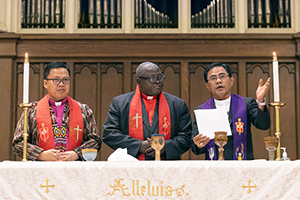Key Points:
- The United Methodist Church’s top court released five decisions and a memorandum in response to questions raised during the last two days of General Conference.
- In a General Conference that saw big changes regarding the denomination's policies on LGBTQ people, the Judicial Council said congregations' boards of trustees still could set policies prohibiting their local churches from hosting same-sex weddings.
- The newly elected Judicial Council members take office with General Conference’s adjournment.
The last day of General Conference, delegates asked The United Methodist Church’s top court to respond to multiple legal questions — most of them about actions the denomination’s lawmaking assembly had just taken.
The Judicial Council released five decisions and a memorandum on May 3 in response to a flurry of requests for declaratory decisions — basically rulings on questions about the meaning, application and effect of church law.
Perhaps most critical to a General Conference that spent the last few days rolling back prohibitions related to LGBTQ ministry including same-sex weddings, the Judicial Council ruled that local churches could still set policies banning such services within their walls.
In Decision 1503, the church court said nothing in the Book of Discipline’s Paragraph 2533 “prevents the Board of Trustees of a local church from adopting policies prohibiting the conduct of worship services that include same-sex marriage ceremonies.”
In Decision 1500, the church court majority responded to a question about regionalization by saying it lacks jurisdiction to review the constitutionality of proposed amendments to the denomination’s constitution and changes to the Books of the Discipline that require ratification of those amendments.
Subscribe to our
e-newsletter
The Judicial Council had received a question about the constitutionality of a part of the proposed plan for regionalization that won’t take effect unless amendments approved by General Conference last week are ratified by a total of at least two thirds of annual conference voters. The regionalization amendments would make the U.S. church and the denomination’s central conferences each regional conferences with equal authority to adapt the denomination’s Discipline.
“A petition for declaratory decision must meet the following two-part test: the request must contain proposed legislation that (1) requires no constitutional amendment(s) for implementation and (2) can be tested directly against the constitutional provisions in effect at the time of filing,” the church court majority said.
"This Petition for Declaratory Decision fails to meet both parts of the test since it contains constitutional amendments and disciplinary changes requiring ratification of the former."
Judicial Council member Beth Capen issued a dissent saying the court does have jurisdiction to review proposed legislation and she perceives petitions requesting changes to the denomination’s constitution as proposed legislation.
In Decision 1501, the Judicial Council responded to a question about whether U.S. bishops elected during 2022 jurisdictional conferences would be eligible to be transferred to a different jurisdiction. Early on May 3, General Conference approved a reduction and distribution of U.S. bishops that would require transferring three active bishops to another jurisdiction.
The Judicial Council determined that the Discipline does not allow a bishop elected in 2022 to be eligible for transfer, since the denomination’s constitution says no bishop will be transferred unless the episcopal leader has served one quadrennium in the jurisdiction where elected.
“The Discipline itself defines the term ‘quadrennium,’” the church court said. “Paragraph 721.2 provides that ‘Unless otherwise specified in the Discipline, the term quadrennium shall be deemed to be the four-year period following the adjournment of the regular session of the General Conference….’”
In Decision 1505, the Judicial Council stood by its ruling in Decision 1501 when the General Conference asked it to clarify.
In Decision 1502, the Judicial Council upheld the role of the Interjurisdictional Committee on the Episcopacy — the body that made the recommendations about the number and distribution of U.S. bishops to the full General Conference.
The Judicial Council noted that the committee made its recommendations based on the authority granted to it by legislation General Conference passed on April 30 that took effect immediately.
“Under the newly amended and effective ¶ 404.2, the Interjurisdictional Committee on Episcopacy has the authority to recommend to the General Conference the number of bishops in all jurisdictions, provided it follows the process set forth in said provision,” the church court said.
In Memorandum 1504, the Judicial Council said it was deferring a question about the rights of deaconesses and home missioners to its fall 2024 docket.
The denomination’s top court has been on standby to respond to General Conference’s requests for decisions throughout the two-week assembly. But the church court received most of its questions during the last two days of this year’s General Conference.
With the adjournment of General Conference, the newly elected members of the Judicial Council take office.
Early May 3, the new Judicial Council held an organizing meeting.
Newly elected officers of the council for the next quadrennium are: the Rev. Susan Henry-Crowe, president; the Rev. Øyvind Helliesen, vice president; and the Rev. Angela Brown, secretary. Henry-Crowe previously served as the body’s president from 2008 to 2012. She was its first woman president.
Hahn is assistant news editor for UM News. Contact her at (615) 742-5470 or newsdesk@umnews.org. To read more United Methodist news, subscribe to the free daily or weekly Digests.





